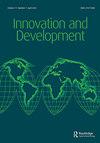自愿欠发达悖论:重新审视弗里曼关于发展中国家自主创新能力的观点
IF 1.7
Q3 DEVELOPMENT STUDIES
引用次数: 1
摘要
越来越多的人认识到大学是一个行动者,有能力表达和回应社会需求和在传统市场结构之外表达的需求。南半球的大学提供了融合空间,来自社会不同群体的知识与北半球的知识精心融合,以产生满足被排斥人群需求的创新。然而,似乎促进了全球南方大学本土能力发展的趋势,加上这种能力与现实生产世界之间令人担忧的脱节,可能会阻碍围绕创新的社会包容性叙事和实践的兴起,从而限制其充分的变革潜力。在这篇文章中,我们借鉴了弗里曼关于自愿欠发展的开创性思想,并将其与(不)令人满意的创新和社会对创新的需求联系起来,以解释这一悖论并提出前进的道路。本文章由计算机程序翻译,如有差异,请以英文原文为准。
The voluntary underdevelopment paradox: revisiting Freeman’s ideas on indigenous capabilities for innovation in the global south
ABSTRACT There is a growing recognition of the university as an actor with the capacity to articulate and respond to societal needs and demands expressed outside conventional market structures. Universities in the global south offer converging spaces where knowledge stemming from different groups in society is carefully weaved with that produced in the global north to produce innovations that cater to the needs of excluded populations. However, the trends that seemed to have enabled the development of indigenous capabilities in global south universities, coupled with a worrying disconnection between such capabilities and the real world of production, may be encumbering the upwelling of socially inclusive narratives and practices around innovation, limiting thus their full transformative potential. In this essay, we draw upon Freeman’s ground-breaking idea of voluntary underdevelopment and bridge it with that of (un)satisfactory innovations and social demands for innovation to explain this paradox and propose a way forward.
求助全文
通过发布文献求助,成功后即可免费获取论文全文。
去求助
来源期刊

Innovation and Development
Social Sciences-Cultural Studies
CiteScore
3.70
自引率
0.00%
发文量
24
期刊介绍:
conomic development and growth depend as much on social innovations as on technological advances. However, the discourse has often been confined to technological innovations in the industrial sector, with insufficient attention being paid to institutional and organisational change and to the informal sector which in some countries in the South plays a significant role. Innovation and Development is an interdisciplinary journal that adopts a broad approach to the study of innovation, in all sectors of the economy and sections of society, furthering understanding of the multidimensional process of innovation and development. It provides a forum for the discussion of issues pertaining to innovation, development and their interaction, both in the developed and developing world, with the aim of encouraging sustainable and inclusive growth. The journal encourages articles that approach the problem broadly in line with innovation system perspective focusing on the evolutionary and institutional structure of innovation and development. This focus cuts across the disciplines of Economics, Sociology, Political Science, Science and Technology Policy, Geography and Development Practice. In a section entitled Innovation in Practice, the journal includes short reports on innovative experiments with proven development impact with a view to encouraging scholars to undertake systematic inquiries on such experiments. Brief abstracts of degree awarded PhD theses in the broad area of concern for the journal and brief notes which highlight innovative ways of using internet resources and new databases or software are also published.
 求助内容:
求助内容: 应助结果提醒方式:
应助结果提醒方式:


